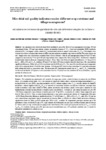Please use this identifier to cite or link to this item:
http://www.alice.cnptia.embrapa.br/alice/handle/doc/854407Full metadata record
| DC Field | Value | Language |
|---|---|---|
| dc.contributor.author | FERREIRA, E. P. de B. | pt_BR |
| dc.contributor.author | SANTOS, H. P. dos | pt_BR |
| dc.contributor.author | COSTA, J. R. | pt_BR |
| dc.contributor.author | DE-POLLI, H. | pt_BR |
| dc.contributor.author | RUMJANEK, N. G. | pt_BR |
| dc.date.accessioned | 2011-04-09T14:41:47Z | - |
| dc.date.available | 2011-04-09T14:41:47Z | - |
| dc.date.created | 2010-06-02 | pt_BR |
| dc.date.issued | 2010 | pt_BR |
| dc.identifier.citation | Revista Ciência Agronômica, v. 41, n. 2, p. 177-183, abr./jun. 2010. | pt_BR |
| dc.identifier.uri | http://www.alice.cnptia.embrapa.br/alice/handle/doc/854407 | pt_BR |
| dc.description | An experiment was carried out under field conditions to assess the effects of soil management (no-tillage- NT and conventional tillage- CT) and crop rotation systems on microbial biomass-C (Cmic), basal soil respiration (BSR), metabolic quotient (qCO2), soil organic carbon content (Corg) and microbial carbon to organic carbon ratio (Cmic/Corg). Soil samples were collected on an area cultivated with wheat as winter crop and soybean as summer crop, both in rotation with vetch, maize and oats. Samples were also collected in a secondary forest used as reference. Data of each management system (NT and CT) were compared to forest area by ?t? test (p<0.05) and crop rotations were compared by Tukey test (p<0.05). All data were submitted to multivariate analysis (Principal Component Analysis - PCA). There were observed significant differences (?t? test; p<0.05) for Cmic, BSR, qCO2 and Cmic/Corg between NT and CT, by which NT values resemble those for forest area. For crop rotations significant differences (Tukey test; p<0.05) were found only for BSR and qCO2. The sum of the two first principal components on the PCA explained about 75% of the data variation. PCA showed NT closest to forest area than CT, especially treatments with soybean and vetch as consecutive crops. The forest area-NT clustering was mostly due to Cmic and Cmic/Corg relationship. Results indicate that the NT system is more sustainable than the CT system and can contribute for the accumulation a greater quantity of carbon in soil. | pt_BR |
| dc.language.iso | eng | eng |
| dc.rights | openAccess | eng |
| dc.subject | Respiração microbiana | pt_BR |
| dc.subject | Biomassa microbiana | pt_BR |
| dc.title | Microbial soil quality indicators under different crop rotations and tillage management. | pt_BR |
| dc.type | Artigo de periódico | pt_BR |
| dc.date.updated | 2011-04-10T11:11:11Z | pt_BR |
| dc.subject.thesagro | Manejo do solo | pt_BR |
| dc.subject.thesagro | Matéria orgânica | pt_BR |
| dc.subject.thesagro | Rotação de cultura | pt_BR |
| dc.subject.thesagro | Biomassa | pt_BR |
| dc.subject.thesagro | Plantio direto | pt_BR |
| dc.subject.thesagro | Carbono | pt_BR |
| riaa.ainfo.id | 854407 | pt_BR |
| riaa.ainfo.lastupdate | 2010-09-02 | pt_BR |
| dc.contributor.institution | ENDERSON PETRONIO DE BRITO FERREIRA, CNPAF; HENRIQUE PEREIRA DOS SANTOS, CNPT; JANAINA RIBEIRO COSTA ROUWS, CNPAB; HELVÉCIO DE-POLLI, CNPAB; NORMA GOUVEA RUMJANEK, CNPAB. | pt_BR |
| Appears in Collections: | Artigo em periódico indexado (CNPAF)  | |










